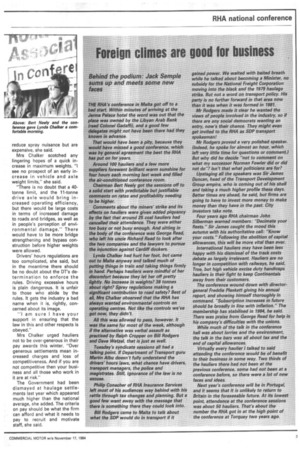Foreign climes are good for business
Page 41

If you've noticed an error in this article please click here to report it so we can fix it.
Behind the podium: Jack Semple sums up and meets some new faces
THE RHA 's conference in Matta got off to a bad start. Within minutes of arriving at the Jerma Palace hotel the word was out that the place was owned by the Libyan Arab Bank (read Colonel Gadaffi), and a good few delegates might not have been there had they known in advance.
That would have been a pity, because they would have missed a good conference, which was by general agreement the best the RHA has put on for years.
Around 100 hauliers and a few more suppliers forewent brilliant warm sunshine for four hours each morning last week and filled the air-conditioned conference room.
Chairman Bert Neely got the sessions off to a solid start with predictable but justifiable comments on rates and profitability needing to be higher.
Comments about the miners' strike and its effects on hauliers were given added piquancy by the fact that around 25 coal hauliers had cancelled their attendance. They were either too busy or not busy enough. And sitting in the body of the conference was George Read, who left his uncle Richard Read to look after the two companies and the lawyers to pursue the injunction against Cardiff dockers.
Lynda Chalker had hurt her foot, but came out to Malta anyway and talked much of putting things in train and taking things firmly in hand. Perhaps hauliers were mindful of her discomfort because they let her off pretty lightly. No increase in weights? 38 tonnes about right? Spray regulations making a significant contribution to road safety? Best of all, Mrs Chalker observed that the RHA has always wanted environmental controls on operating centres. Not like the controls we've got now, they didn't.
All this was allowed to pass, however. It was the same for most of the week, although if the alternative was verbal assault as practised by Ralph Cropper on Bill Rodgers and Dave Wetzel, that is just as well.
Tuesday's syndicate sessions all had a talking point. If Department of Transport guru Martin Albu doesn't fully understand the drivers' hours laws, what chance have drivers, transport managers, the police and magistrates. Stilt ignorance of the law is no excuse.
Philip Conacher of RHA Insurance Services left most of his audiences way behind with his rattle through tax changes and planning. But a good few went away with the message that there is something there they could look into.
Bill Rodgers came to Malta to talk about what the SDP would do in transport if it
gained power We waited with baited breath while he talked about becoming a Minister, no subsidy for the National Freight Corporation moving into the black and the 1979 haulage strike. But not a word on transport policy. His party is no further forward in that area now than it was when it was formed in 1981.
Mr Rodgers made it clear he wanted the views of people involved in the industry, so if there are any social democrats wanting an entry, now's their chance. They might even get invited to the RHA as SDP transport spokesman!
Mr Rodgers proved a very polished speaker, (Indeed, he spoke for almost an hour, which left very little time for questions or comment.) But why did he decide -not to comment on what my successor Norman Fowler did or did not do"? Isn't that what politicians are for?
Upstaging all the speakers was Sir James Duncan, head of the Transport Development Group empire, who is coming out of his shell and taking a much higher profile these days. Better times are ahead, he said, but firms are going to have to invest more money to make money than they have in the past. City investors take note.
Four years ago RHA chairman John Silberman warned members. -Decimate your fleets." Sir James caught the mood this autumn with his authoritative call: -Know your costs.Following the abolition of capital allowances, this will be more vital than ever.
International hauliers may have been less happy with his dismissal of the track costs debate as largely irrelevant. Hauliers are no longer in competition with railways, he said. True, but high vehicle excise duty handicaps hauliers in their fight to keep Continentals away from their customers.
The conference wound down with directorgeneral Freddie Plaskett giving his annual report, and showing himself thoroughly in command. "Subscription increases in future should be broadly in line with inflation." The membership has stabilised in 1984, he said. There was praise from George Read for help in his company's difficulties with the unions.
While much of the talk in the conference hall was about lorries and the environment, the talk in the bars was all about tax and the end of capital allowances.
Virtually every haulier I talked to said attending the conference would be of benefit to their business in some way. Two thirds of the hauliers there had not been at the previous conference, some had not been at a conference before, so there were a lot of new faces and ideas.
Next year's conference will be in Portugal, and it seems that it is unlikely to return to Britain in the foreseeable future. At its lowest point, attendance at the conference sessions was about 50 hauliers. That's about the number the RHA got in at the high point of the conference at Torquay two years ago.












































































































